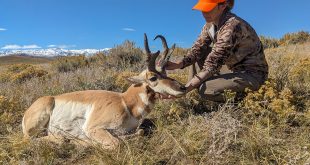CWD Data Manipulation = More $$$
By Anita Wadhwani
Note: This blog has been shared from the following link: https://tennesseelookout.com/2023/09/07/former-tennessee-wildlife-and-resources-agency-biologist-agency-manipulated-data-on-deer-disease
Former Tennessee Wildlife and Resources Agency biologist: agency manipulated data on deer disease
In a lawsuit filed against the agency, the former employee claims officials misled the public about the rate of neurological disorder in deer, changing protocols to avoid admitting mistakes
BY: ANITA WADHWANI – SEPTEMBER 7, 2023 6:01 AM
A state biologist claims he was confronted in his home by law enforcement officers with the Tennessee Wildlife Resources Agency on the same day he sent his boss’s superiors evidence that the state was falsifying data on wildlife diseases.
After his cell phone, laptops and other items were confiscated, the biologist said he was then subjected to hours of questioning by officers — among them the husband of his immediate supervisor.
James Kelly, a wildlife biologist, led the Tennessee Wildlife Resources Agency’s deer management program, chaired the agency’s CWD Deer Management Standing Team and served as a wildlife biologist until he was fired in 2022.
In a whistleblower lawsuit filed this week, Kelly alleges state officials manipulated data and misled the public about the prevalence of chronic wasting disease, a fatal and infectious disease that attacks deer populations.
He claims TWRA failed to follow best scientific practices and its own regulations in diagnosing potentially infected deer. He also claims TWRA chose to forgo more expensive and accurate lab testing then rewrote its regulations to keep its data mistakes from the public before dispatching law enforcement officers to Kelly’s home, interrogating him then firing him after he sought to make his allegations public.
The consequences of releasing inaccurate data, according to the lawsuit, was overinflated reporting of the prevalence of the disease in multiple Tennessee counties. Instead of 16 counties with confirmed CWD cases reported by the state, Kelly claims there have only ever been two: Hardeman and Fayette counties.
The over-reporting of cases leads to economic impacts in counties now avoided by some hunters and lost hunting fees collected by private property owners. It can also inadvertently lead to the spread of disease; once a county has been designated at risk for disease, diseased deer may be transported there for disposal, posing a potential infection hazard for otherwise uninfected deer in that county, the lawsuit said.
Incorrect reporting on disease prevalence can also increase public costs for state intervention and monitoring, including added staffing, testing, harvest incentive payments to hunters and carcass incinerators. According to TWRA’s most recent disease management plan, it spent more than $1.2 million on chronic waste disease in the last fiscal year.
“Incorrectly reporting the spread of CWD can have an economic impact on the counties where CWD is reportedly found, and it can have an impact on a state wildlife agency’s use of funds and resources,” the lawsuit said. TWRA has “engaged in fraud and mismanagement of its CWD program,” it said.
A spokesperson for TWRA declined to offer comment on pending litigation Wednesday but issued a statement that disputed claims that the state had publicized faulty data. The state’s protocols are based on “extensive vetting of the latest peer-reviewed research,” the statement said.
William Caldwell, Kelly’s attorney, declined comment.
Chronic wasting disease is a fatal neurological disorder with no known cure that affects deer and elk populations, whose carcasses can also remain contagious. According to the Centers for Disease Control, there have been no reported cases of human transmission. The detection of disease, however, requires state intervention and monitoring to prevent its spread.
The agency first detected disease in 10 deer harvested in Fayette and Hardeman Counties in 2018.
At the time, the lawsuit said, TWRA followed the same practice of every other state: first screening tissue through a process known as enzyme-linked immunosorbent assay (ELISA) then getting a second, more expensive test using known as immunohistochemistry (IHC) testing to confirm positives. ELISA testing yields a high number of false positives, the lawsuit said.
But as the number of samples being collected grew, TWRA ceased using IHC testing to confirm the results. Today, 16 counties are designated as being positive or at high risk for disease.
Kelly, 36, in 2021 grew suspicious at the high number of positive results. He began reviewing lab results and concluded that too many counties were being added, and too fast. He shared his concern that tests were yielding inaccurate results with other TWRA officials. Officials agreed to send positive samples for further IHC testing. None of the tests were found positive under this testing method, the lawsuit said.
The lawsuit claims that rather than admit to hunters, local governments and wildlife officials that mistakes may have been made to designate all 16 counties as positive or at risk for CWD, the agency created new protocols that allowed state officials to ignore the results of the second test. It also claims the new protocols would allow the agency to keep from admitting mistakes to Kentucky wildlife officials, who expended resources creating disease response after TWRA officials reported a bordering Tennessee county had a positive test.
“In other words, rather than respond to the discrepancies in CWD testing results by following its rules and protocols, the TWRA changed the rules and protocols to avoid having to admit mistakes,” the lawsuit claims.
A spokesperson for TWRA said Wednesday agency personnel could not comment on pending legislation. But, in a statement released about the state testing methods, the agency disputed Kelly’s allegations about the validity of their tests.
“The ELISA test used at the laboratories to detect CWD prions has been shown to be effective for early detection of disease, including animals recently infected but not yet showing symptoms,” the statement said. “For the agency, the results are critical for the continued surveillance and monitoring of CWD. Last season was the first since the discovery of CWD in Tennessee there was not a spread of the disease to new counties, which we believe is a positive indicator that current management protocols are working.”
Frustrated by his efforts to call attention to the problem, Kelly said he wrote a memo to the Tennessee Fish and Wildlife Commission, the agency’s oversight board.
The day Kelly sent the memo, TWRA officers arrived at his home to hand deliver a letter placing him on leave. The wildlife law enforcement officers confiscated his cell phone, keys and laptops.
Kelly was then ordered to TWRA headquarters, where he was “questioned by law enforcement officers for hours” — among them a TWRA law enforcement officer married to Kelly’s immediate supervisor.
The lawsuit calls Kelly’s treatment “malicious and willful.”
The lawsuit claims TWRA violated state laws protecting state employee and citizen whistleblower complaints. TWRA has not yet filed its legal response.
 Eastmans' Official Blog | Mule Deer, Antelope, Elk Hunting and Bowhunting Magazine | Eastmans' Hunting Journals
Eastmans' Official Blog | Mule Deer, Antelope, Elk Hunting and Bowhunting Magazine | Eastmans' Hunting Journals





